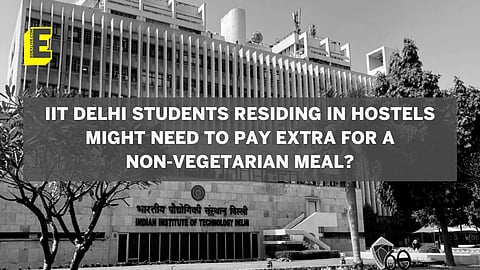

Students of the Indian Institute of Technology (IIT) Delhi have alleged that the institution might start charging an additional amount from students if they choose to eat non-vegetarian food (only chicken) at the hostel's mess. An X account with the username @VoiceofIITD posted a screenshot of a "consent form" on January 13, Saturday, that has been circulated among the students residing in hostels Dronagiri and Saptagiri of the institution.
The post, depicting a part of the consent form, stated how the students need to agree to pay a surcharge on the already deposited amount for the hostel mess charges, if it comes to it. The screenshot says, "The purpose of this form is that whatever cost is incurred through non-veg (chicken) food that cost will be distributed among the non-veg (chicken) eating people only." It also mentions
The consent form, which EdexLive has access to, was mandatory for the students to fill, a point mentioned on the form. Once the student fills the form, a QR code is generated and only then, will the students be allowed entry into the mess.
The consent form that was circulated among the hostellers on Friday, January 12, by the mess secretary of the hostel, also mentioned that filling up the form is crucial as segregated spaces are allotted for those who opt for non-vegetarian food in the Dronagiri mess and vegetarian food in the Saptagiri mess.
But the problem this time is not the allotment of segregated spaces.
What is the issue?
The caption of the post reads as follows, "IITD now faces a new controversy post-IITB. They plan to charge extra in the mess for non-vegetarian meals given weekly. What about those who don't prefer South Indian, dairy, or eggs? Will the college have different bills for each preference?"
A hosteller and a student of IIT Delhi, on the condition of anonymity, say that it has now been decided to serve a chicken meal (consisting of a regular meal with two pieces of chicken) only once a week to the students, and shared, "After 2013, IIT hostel mess had decided to stop cooking non-vegetarian in the mess kitchen, and then, vendors were hired to serve chicken and they charge an additional amount to be paid on the spot."
Though a proposal has been submitted by the students, the hostels are yet to resume serving chicken meals in segregated cooking spaces and utensils, added another hosteller of the same institution.
But a problem remains.
The student further adds that according to data released by the institute, almost 800 students reside in the hostels and 500 students prefer eating non-vegetarian food and the rest are vegetarians. The amount, previously, was divided equally amongst the students despite their choice of food, he said.
He states that levying an extra charge for their different dietary preference is not fair. While expressing the problem with the decision taken, he says, "If someone does not eat dairy products, would they pay less? There are Jain students in the hostel but they pay the same as us. People can have different food choices and the hostel mess can introduce a few varieties but levying an extra charge seems pointless."
The other student says that this is not the only charge that is incurred by the students, there are other maintenance charges including the raw materials, charges for the workers that include daily wagers and regular/contractual workers, and other miscellaneous expenses which are borne by the students.
He says that these costs are divided into two broad categories: an establishment cost (fixed cost) which is levied on all equally in the institution and a non-establishment cost, which is levied on a hostel-wise basis. This non-establishment cost includes food preparation, fuel, food prep charges, daily wage workers, cultural and other costs.
The process of calculation of the non-establishment charge is not an easy procedure, he adds. The procedure takes into account the total number of student days (the cumulative number of days a student resides in the hostel in one semester) divided by the cumulative bill for the semester. The number of student days depends on how many days a student decides to skip mess food. He adds, "Such a way of division is done on an actual basis, not giving a perfect rational number, but since the process is so complicated, none of the students try to understand the numbers and pay the amount."
It is to be noted that students at IIT stopped receiving a subsidy after 2019, thereby, substantially leading to an increase in the hostel charges. Both the students EdexLive spoke to unanimously questioned the proposed added amount, which they previously had hoped would be lower as compared to the charges levied by the vendor now. They expressed their scepticism regarding the added charges being imposed on an aspect as basic as food.
